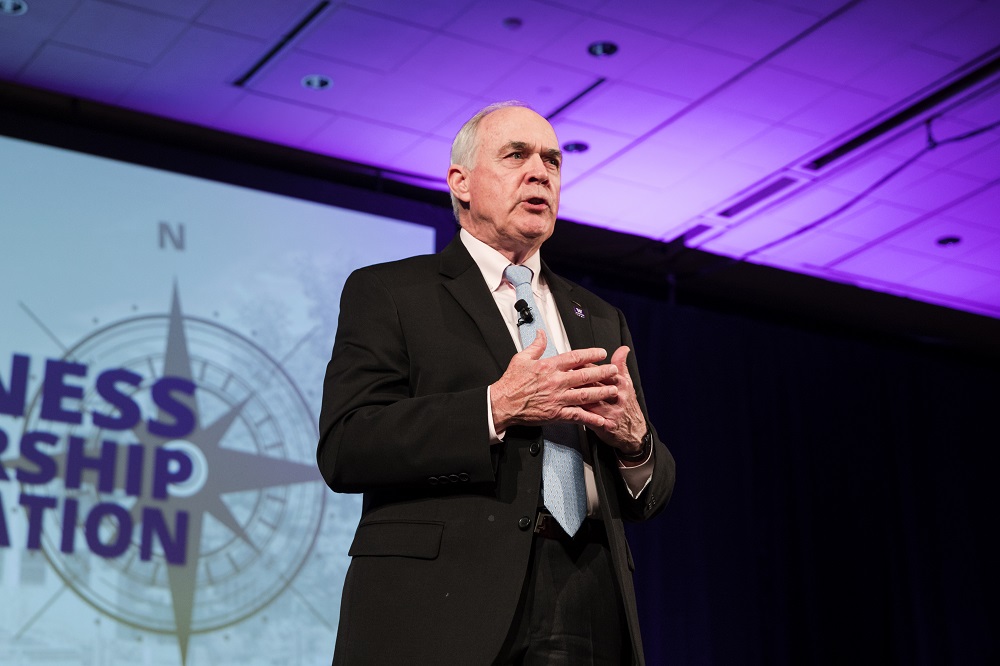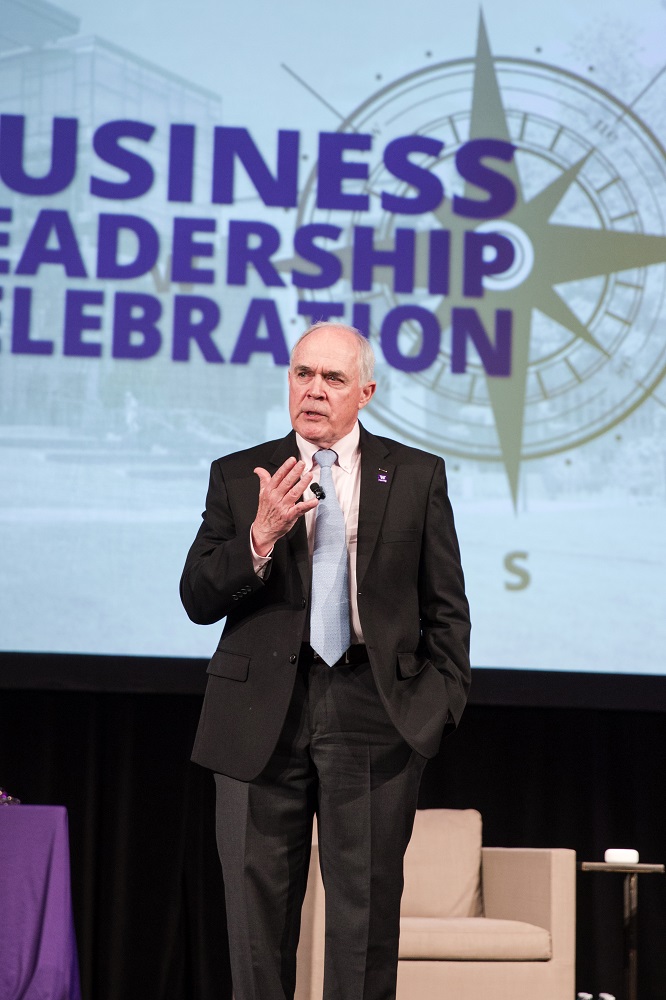BLC 2019: Pat Bettin on compassionate leadership in the toughest of circumstances
 The UW Foster School’s 28th annual Business Leadership Celebration featured a quintet of the school’s most-decorated faculty giving TED-style talks on different “Facets of Leadership.”
The UW Foster School’s 28th annual Business Leadership Celebration featured a quintet of the school’s most-decorated faculty giving TED-style talks on different “Facets of Leadership.”
Pat Bettin, a senior lecturer of management and near-perennial winner of teaching awards in Foster’s Executive Education and various MBA Programs, unpacked a powerful metaphor of holistic leadership, and employed a personal story to illustrate the necessity of compassionate leadership in the most extreme circumstances.
Here is the text of Bettin’s lecture:
I’d like to share a metaphor that I think captures the essence of leadership. Effective leadership connects the head to the heart to the gut.
The best leaders that I’ve ever read about, talked to, heard of, seem to practice that holistic metaphor.
The head
The head is rational cognitive skills. The ability to think things through. To come up with thoughtful, rational solutions to very complex problems rather than emotional reaction to them.
The heart
At the heart there are three qualities: passion, courage and compassion.
The best leaders seem to be truly passionate people. They believe in what they are doing. And the passion they have is infectious. It energizes other people who want to be with them to make it happen.
They’ve got the courage to challenge the status quo towards the end goal. The courage to want to create something better than what’s already there, to move forward. The courage to take appropriate levels of risk. The courage to persevere, even though the near-term data isn’t supporting their direction. It takes a lot of courage to continue down a path when you don’t get confirming evidence that it’s the right path.
They also, however, have the courage to let go. To acknowledge that the direction they’ve charted is incorrect, isn’t going to work. It takes a lot of courage to say we were wrong, and now we have to adapt and be agile.
The third part of the heart is compassion: the ability to see the impact of your leadership on the lives of other people. Giving you an appropriate level of empathy to see it from their perspective.
The gut
And then at the gut, there are two things: commitment and intuition.
The best leaders seem to be truly committed to their organization, to their colleagues and co-workers, to the communities that they live, work and play in. And that commitment gives them a sense of perspective. They see themselves as part of something bigger, more important than their individual career or personal goals. And from that perspective comes a very good, healthy humility. To be self-confident, yet humble at the same time.
And then the other part is intuition. This kind of gut feeling. When to be hard, when to be soft. When to tighten and when to loosen. Where do they get that sense of intuition? They’re not born with it. It comes from their experiences. The ability to reflect on where they’ve been, what they’re doing. And from that sense of reflection comes a sense that I can anticipate what is about to happen.
Bringing metaphor to life
I’d like to bring that metaphor to life by sharing with you a story about a person who’s had a huge impact on me personally.
I spent most of my adult life as a paratrooper in the US Army. And I was a 20 year old second lieutenant with a rifle company in Vietnam just in time for Tet in 1968. In those days, a rife company was relatively small, maybe 80 to 90 soldiers out in the bush with a rifle and a rucksack, and a few more back in base camp doing logistics and resupply. And at one point, for 14 consecutive days, at least one of those 90 soldiers—sometimes more than one—was killed. Every single day for 14 consecutive days.
You listen to soldiers talk, and they say things like, “There are more days than there us.” “If I’m going to get it, I’d rather get it sooner than later.” Almost a fatalistic perspective.
Compassionate leadership in extremis
In the middle of those 14 days, we got a new company commander. A guy by the name of George Quigley. And after a day or two he gathered us together and said, “I want you to see that those soldiers shave every day, brush their teeth every day, change their socks every day.”
And you could hear the mumbling: “What does he think this is, a parade field? Pretty soon we’ll have to polish our boots!”
His response to that was, no. He said, “War can turn men to animals trying to survive. But someday they’re going to go home. And they should go home as human beings, not as animals.”
He looked at us and said, “If you do nothing else while you are here, you preserve their humanity.”
He’s the person who taught me about compassion. In the middle of the ugliest, the dirtiest, the most difficult and challenging times, these are still people that we are responsible for. And to treat them with dignity, with respect, with humanity, is so critical for us as we move forward as leaders.
So, I leave you with this metaphor. The head—rational, cognitive thought. The heart—passion, courage, compassion. The gut—perspective from commitment and intuition.

